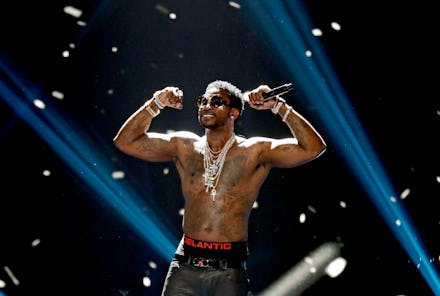Gucci Mane 'Woptober' Review: A bold return to the streets where the MC's hustle began

Since his release from prison in May, Gucci Mane has hardly paused to catch a breath. From showing out on Snapchat to gracing magazine covers to performing for rapturous crowds and, most notably, running riot in the studio, Gucci has brought new meaning to the phrase "carpe diem." Nearly three months after his post-prison comeback, July's Everybody Looking, Gucci's returned with yet another full-length project to fan the flames, aptly titled Woptober.
Fresh off court-ordered house arrest, Gucci commemorates the occasion with a new album that builds on the momentum of his post-prison run and delivers some of his best work in years. Functioning as less of a statement piece, Woptober trades in the blockbuster guest appearances, introspection and polish found on Everybody Looking for a return to the rugged and galvanizing street rap of Trap House-era mixtapes. It offers glimpses of the same verve and hunger that got him his start a decade ago, deftly updated to match hip-hop's present styles.
During a recent stop at New York rap station Hot 97 in September, Gucci shared with DJ Funkmaster Flex how embracing youth culture and rising talent has been a guiding principle to maintaining relevance in rap's constantly evolving center. "I embrace anything that's new," he told Flex in the interview. "At the end of the day, it's a different generation. It's theirs, not mine. But instead of me judging it, I embrace it and support it."
From collaborating with Soulja Boy and Shawty Lo on their 2008 smash "Gucci Bandana" to appearing on the recent SremmLife 2 gem "Black Beatles," Gucci has long possessed a soothsayer's gift for sensing who's hot and what's hot, and Woptober is a crystalline example of that.
On standout track "Hi-Five," Metro Boomin provides more of the brooding, ambient production he masterminded for 21 Savage's Savage Mode, while Gucci spins aspirational proverbs in an effortless flow. By the time he shifts into fifth gear on the second verse, he starts to lay rhymes with such dexterity and panache that you have to run it back to truly appreciate their wonder:
Fuck yo jam of the week, I put grams on the street
It's refreshing to hear a veteran artist find their stride in a new sound so gracefully. That's what true legends do: They recontextualize themselves to remain icons for their proteges. And Gucci's, of course, are some of the most promising hip-hop has to offer: Future, Young Thug and Nicki Minaj.
Still, this is Gucci Mane, the man who got his ice cream cone tattoo on his face loud and proud. Woptober displays the same trademark flamboyance and quirk Gucci Mane's known for, but now more purposefully. On "Money Machine," he tosses together references to quinoa and crime films, seemingly because he can. He makes room for a proper Rick Ross feature, and employs a playfully repetitive hook that describes the beeping sound his money counter makes. On paper, it's an odd combination, but La Flare makes it work and it 100% earns its spot.
Gucci Mane's return this year would have been a significant moment for culture, regardless of how hard he pushed his post-prison takeover. Returning with one decent album would've made for a nice comeback narrative, but following that up with a second, even leaner, more cutthroat album in such a short timespan adds to the incredible mythology of his career. Gucci Mane is a self-made boss, a hustler and an everyman, capable of connecting with millions with the truth of his bars and his undying determination to win. It's clear he hasn't forgotten his roots, and Woptober provides yet another thrilling soundtrack for anyone trying to flip something out of nothing.